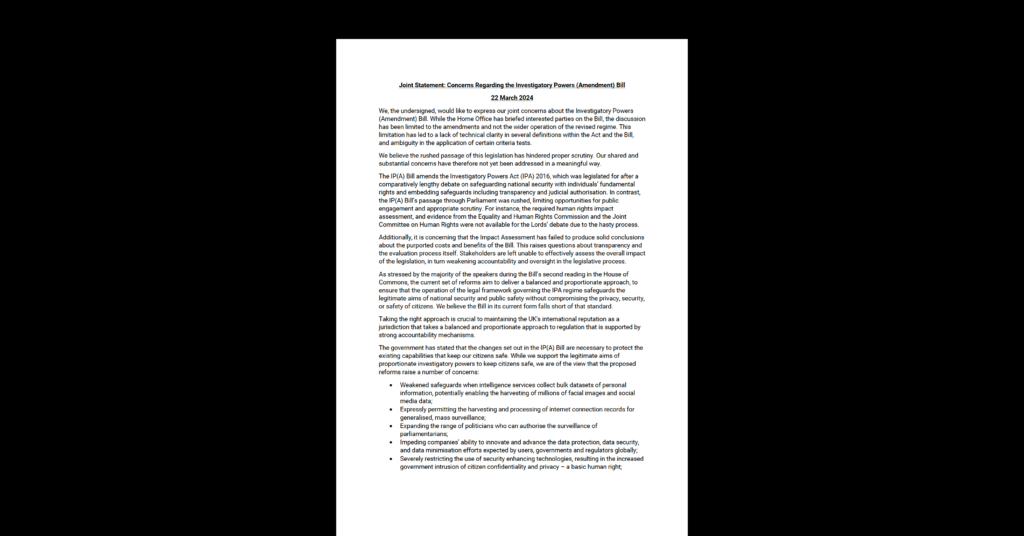EU-U.S. Digital Deals Must Put Democracy First
In a much anticipated event, on June 15 in Brussels, EU and U.S. leaders will meet for the first summit since the change in administration in the US. Ambitions are high. Tech policy and efforts to bolster global democracy are top of the agenda. The hope is to showcase a new transatlantic body the ‘EU- U.S. Trade and Technology Council (TCC)’ where both parties have expressed the desire to ensure that democracies not autocracies write the rules on trade and technology. This global perspective is to be welcomed, but what is needed to truly protect democracy and human rights in the digital age?
Late last year, the EU proposed a new transatlantic agenda for global change. The EU proposed: “To create a specific dialogue with the US on the responsibility of online platforms and Big Tech,” and to tackle the challenges posed by “cooperation on regulation and standards.” On both sides of the Atlantic, lawmakers are working hard to try and find new regulatory solutions, not least in response to the realization that content moderation practices in particular can have significant consequences for the integrity of democracy. To put the protection of democracy central to EU-U.S. cooperation on tech issues will require honest reflection on the differences in approaches in the EU and the U.S., and also a deliberate effort not to embolden the autocracies they seek to out-run by adopting rules that might very well foster authoritarianism.
For example, one topic grabbing attention on both sides of the Atlantic is disinformation, the use of false information to deliberately spread to mislead or further a certain agenda. It can erode trust in the democratic process, threaten the credibility and administration of elections, suppress voter participation and interfere with the public’s right to know. There is a strong temptation for governments to appoint themselves “Ministries of Truth” in response to this phenomenon, but there are worrying pitfalls, not least legislation purporting to address disinformation being used to attack the press and human rights defenders. Any system that allows governments to force companies to take down content is a recipe for authoritarian rule.
So what might EU and U.S. leaders better focus on? For a start, to agree that the most powerful way to counter disinformation is with authoritative, fact-based information. This means ensuring, in the context of elections for instance, that state authorities sharing information about where and how to vote are digitally savvy and are capable of running a formidable online communications campaign. More importantly perhaps, there needs to be a recognition of some of the mechanisms facilitating the spread of disinformation, e.g., pervasive tracking and abuse of user data. In the EU, the General Data Protection Regulation (GDPR) needs to be more robustly enforced in order to reach its potential in limiting disinformation, and in the U.S., the Biden Administration should kick start conversations about enacting federal-level privacy laws. Global leadership will require an acknowledgement on each party’s shortcomings in the area of privacy and data protection, as well as a commitment to identify the drivers, rather than the content, of disinformation.
Another overarching theme will be the responsibility of online platforms. This is welcome and overdue. Online platforms are imposing their own rules on our online information ecosystems with little public debate, transparency or avenues for redress. At the same time, it could strike a blow to democracy the world over, should these world leaders normalize the holding to account of online platforms liable for user-generated content.
Although it may sound counter-intuitive, introducing overly broad liability regimes for companies for user-generated content would either give companies an incentive to censor, filter and remove as much content as possible, both lawful and unlawful, or to adopt a neutral role and not take action against disinformation or online harassment. Most likely, the giant incumbents would crack down on speech they consider “borderline,” while their small start-up competitors that lack the resources to actively moderate would end up becoming free-for-all sites that are hostile to vulnerable individuals and communities.
Holding intermediaries accountable is used in jurisdictions where democracy is under pressure, such as China, India, Turkey and Egypt, as an excuse to circumvent national human rights obligations by asking private companies to take down content based on broad definitions of what is impermissible or to further the government’s political interests, without due process safeguards. Here again, whilst pursuing a global agenda, both sides would be better to focus their energy on the need for strong transparency requirements for companies and for strong procedural safeguards for users. To protect journalists, human rights defenders and others online, the parties should advocate that people have avenues to remedy, and that the judiciary remains the final arbiter on decisions on the legality of speech.
A logical follow-on from this might be a new international convention on privacy and content moderation, although the reality is that such an endeavor might take decades to achieve. In the interim, international human rights law provides a ready-made globally agreed normative framework through which to tackle disinformation, and the challenge of content moderation more generally. For example, General Comment 25 of the UN Human Rights Committee already clarifies that Article 19 of the International Covenant on Civil and Political rights, one of the most ratified conventions in the world, includes the right to form your own opinion freely. Electoral micro-targeting clearly jeopardizes this. Equally, the international human rights framework including numerous reports by the UN Special Rapporteurs on Freedom of Expression provide excellent guidance on a rights-based approach to protecting speech and, with it, democracy online. To truly promote a value-based vision to regulation of the online world, the U.S. and the EU need to put democracy first and chart a strategy of support for international human rights standards at the heart of their new digital joint agenda. Nothing would displease authoritarian governments more.


